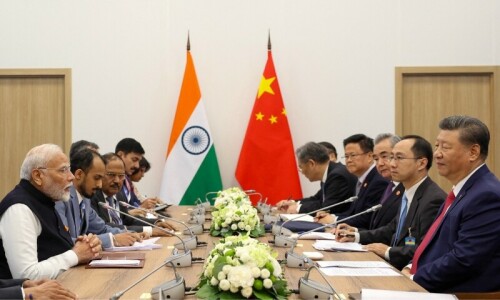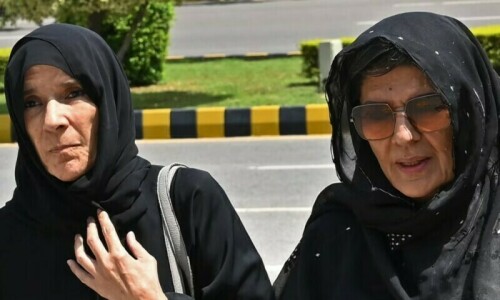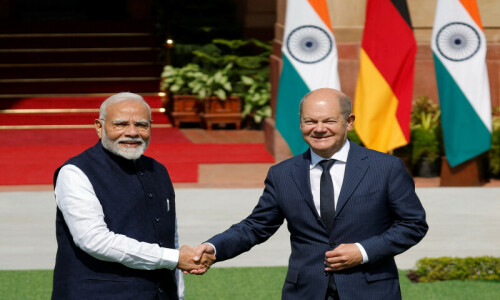IN Pakistan’s vastly fractured society, there appear to be sub-cultural groups which overlap with, and cross over from, the usual socioeconomic classes. One sub-cultural group, which is quite the majority, is composed of those who view any dealings with the courts with suspicion.
As a litigator, however, I am more interested in those people who are willing to pull the chains of justice even if only to find them rusted. A conversation with many a client begins and ends with their plea that they have been constrained to come to the court for their ‘rights’.
This rights-centred discourse offers a peek into our constitutional set-up that has allowed our legal institutions to evolve within a framework of power contestations within the state. I propose to view this evolution through the lens of legal ethnography.
The latter involves looking at how constitutional systems operate within complex interrelationships and with political, legal, historical, social, economic and cultural elements.
The Pakistani constitutional experience is a riveting one. We have a large system of courts, interwoven webs of complex and archaic laws and precedents, and the cherry on top — legal institutions which routinely flex their legal muscle even if to remind the state that they are there.
From a legal ethnographic perspective, the development of constitutionalism (that is to say political developments of drafting, and eventually implementing, constitutional principles) has not been a background affair; rather, it has emerged from battles fought on the aptly named Constitution Avenue.
Courts adjudicate even on issues outside their domain.
Legal ethnography allows us to understand that these developments are not simply one-dimensional; they actually encapsulate the various contestations of power, epistemes, cultures and socioeconomic standing. In theory, it would appear that the apex court being a constitutional court, is the arbitrator of such contestations, especially in an era where every political drama’s last act seems to be played out in the courtrooms for the resolution of political grievances by those who are not elected representatives.
However, in the Pakistani experience, the perception is that it is the judiciary that juggles these contestations, appealing to certain groups over others, and advocates certain legal principles in order to procure a more ‘happening’ role within the state apparatus. Meanwhile, the overwhelming emphasis on rights and doctrinal developments of ever-expanding judicial reviews based on the rights-based discourse provide the backdrop against which these contestations are juggled.
Rights-based constitutionalism has allowed courts in Pakistan to adjudicate even on those issues which do not fall completely within their domain. It has allowed the judiciary to spread its wings under the garb of judicial review. Gone is the old order of prerogative writs; we now have the heady domain of suo motu. By widening the ambit of judicial review, the courts have caused the judicialisation of politics. This judicialisation is in fact the judiciary juggling competing contestations of power, which results in a difficult balancing act, with competing elites advocating their own positions of power including their outlook on statehood.
Institutions and some political elites take recourse to judicialisation in order to wrest power from democratic political processes where they stand to lose. Economic elites and landowners figure in this show by advocating the power of the courts to enforce contracts (even in references sent by the president). The judicature is also perceived as a player with its powers increased as a means to seek out prestige and fame.
In Pakistan of late, governance, administration and corporate functioning are all being routed through the courts. Issues ranging from gender to appointments in the government get dragged to the courts.
This judicialisation is not a simple affair; it entails a complex web of contestations which ultimately, and due to the influence of certain elite sections as well as institutions that make up such sections, results in the alienation of grassroots democratic governance and processes.
It is, therefore, no wonder that we keep hearing whispers about a technocratic set-up. A legal ethnographic understanding of the constitutional evolution of Pakistan shows that beneath the increase in the powers of the judiciary, there is a shift whereby politics and policymaking have been co-opted by unelected institutions.
That this is the result of rights-based developments in our constitutional set-up is somewhat surprising, at least for this writer, but for the clients who insist on their rights it is sheer state hypocrisy.
The writer is a litigator based in Islamabad.
Published in Dawn, March 2nd, 2023













































Dear visitor, the comments section is undergoing an overhaul and will return soon.